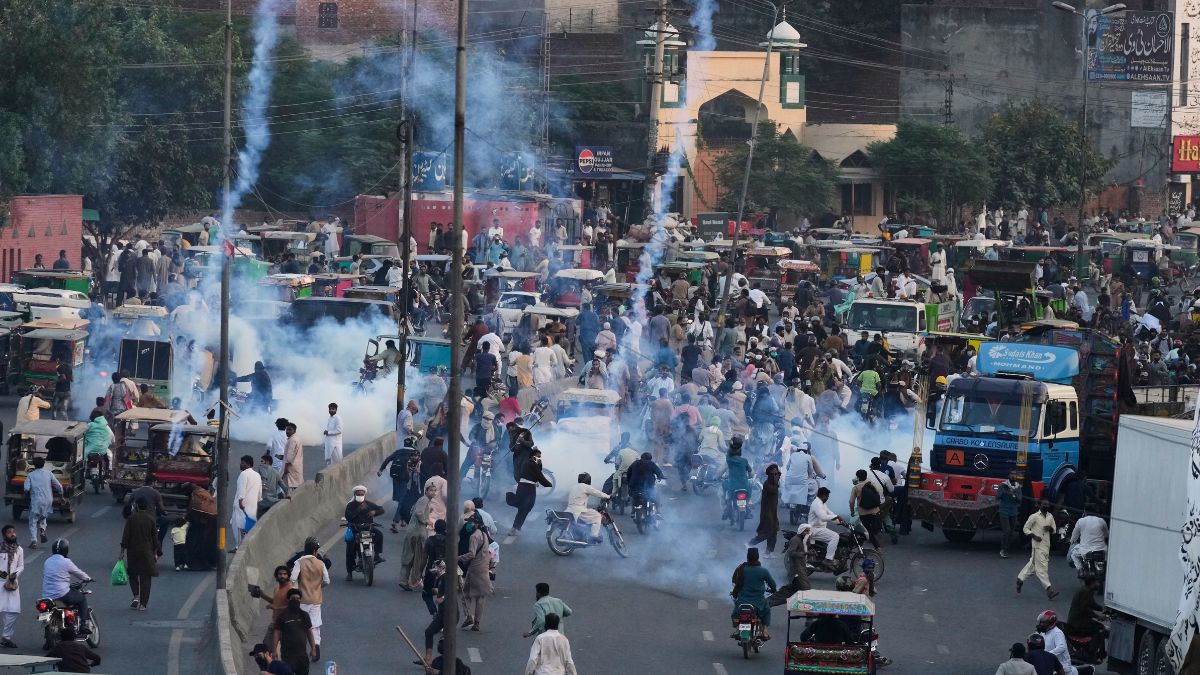What is Tehreek-e-Labbaik and why can't Pakistan contain them?

Violent clashes took place in Lahore, Pakistan, on Saturday after the police and protesters from the right-wing extremist group and Islamist outfit Tehreek-e-Labbaik Pakistan (TLP) faced off. The police had tried to stop the party from marching to the capital, where they were planning to hold a protest against the killing in Gaza and the recent ceasefire between Israel and Hamas.
Security forces barricaded major roads to the capital on Friday. As police forces attempted to block the protesters, violent clashes took place, which left two dead and dozens more injured. About 50 police officers were also injured, according to a report on Dawn.
Mobile internet has been suspended, and sensitive areas have been sealed off. Over 150 TLP members were arrested following the protests.
Here are a few things to know about the Tehreek-e-Labbaik Pakistan:
- The Tehreek-e-Labbaik Pakistan (Here I am Movement of Pakistan ) is a far-right Islamist political party. It was founded on August 1, 2015, by Khadim Hussain Rizvi and began as an Islamist social and political movement. The party is currently being led by Saad Hussain Rizvi, who succeeded his father. Rizvi was arrested on Friday following the protests.
- Ideologically, the TLP stands as a far-right extremist group that calls for the establishment of a Sharia-driven Islamic state. The party mainly caters to the majority Sunni population in the country, specially to the Barelvis, a Sunni revivalist movement which makes up about 50 per cent of the population.
- The TLP is known for its strategic use of violent protests to influence government decisions in Pakistan. They are also notorious for their extreme stance on Pakistan’s Blasphemy law and have protested using violent means, including lynchings and mob justice, against any attempt to make changes to it.
- The party is known for being a proxy of the Pakistan army. According to studies, the TLP only rose to power because the military establishment in the country allowed it. However, the group itself does not have an armed militant wing.
- In 2018, the TLP emerged as the largest religious political party in the elections. In the 2024 Pakistan elections, the party became the fourth biggest in the country after securing about 2.5 million votes.
- The party has continuously targeted religious minorities, including Ahmadiyyas, the country's largest religious minority. In a recent incident, 25 Ahmaddiyas had to be provided protection after TLP activists disrupted their prayers. The party has also been associated with over 25 church burnings in the country.
- The party first became known when it made headlines in 2017 for massive protests in Islamabad triggered by the government's refusal to arrest a minister who was accused of blasphemy. The protests led to a political crisis, and the Pakistani army had to step in to put an end to it.
- In 2021, the party held multiple protests against French and Danish embassies in protest against cartoons depicting of Prophet Muhammad. The protests killed more than 20 people, many of them police officers. The United States had designated the TLP a terrorist organisation in 2019 due to its violent tactics and extremism. However, in 2021, it was removed from the list.
- In April 2021, the Chief of the party, Saad Rizvi, was jailed under anti-terror laws. The party was also banned in the same month. Massive violent protests followed, which led to the deaths of multiple police officials. Just months after the ban, the government of Pakistan, led by Imran Khan overturned it. The deal was said to have been negotiated by the military. The Pakistan government had tried to bann the TLP twice. Both times they struggled to contain the group's influence.
- In 2018, during the country’s national assembly elections, the military had reportedly utilised the the TLP to provide an advantage to the PTI party against the PML-N, according to an article by the Indian Council on Global Relations. The council also said that despite the protests and the violence, the group is seen as a containable outfit by the military, which “can do their dirty work” unlike the anti-state insurgent group Tehreek-i-Taliban.
World